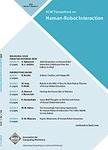版权所有:内蒙古大学图书馆 技术提供:维普资讯• 智图
内蒙古自治区呼和浩特市赛罕区大学西街235号 邮编: 010021

作者机构:Univ Hertfordshire Coll Lane Hatfield AL10 9AB Herts England Univ Macerata Ple Luigi Bertelli 1 I-62100 Macerata Italy Univ Waterloo 200 Univ Ave W Waterloo ON N2L 3G1 Canada
出 版 物:《ACM TRANSACTIONS ON HUMAN-ROBOT INTERACTION》 (ACM Trans. Hum. Robot Interact)
年 卷 期:2019年第8卷第4期
页 面:1–26页
核心收录:
主 题:Developmental robotics language acquisition symbol grounding human-robot interaction
摘 要:No is one of the first ten words used by children and embodies the first form of linguistic negation. Despite its early occurrence, the details of its acquisition remain largely unknown. The circumstance that no cannot be construed as a label for perceptible objects or events puts it outside the scope of most modern accounts of language acquisition. Moreover, most symbol grounding architectures will struggle to ground the word due to its non-referential character. The presented work extends symbol grounding to encompass affect and motivation. In a study involving the child-like robot iCub, we attempt to illuminate the acquisition process of negation words. The robot is deployed in speech-wise unconstrained interaction with participants acting as its language teachers. The results corroborate the hypothesis that affect or volition plays a pivotal role in the acquisition process. Negation words are prosodically salient within prohibitive utterances and negative intent interpretations such that they can be easily isolated from the teacher s speech signal. These words subsequently may be grounded in negative affective states. However, observations of the nature of prohibition and the temporal relationships between its linguistic and extra-linguistic components raise questions over the suitability of Hebbian-type algorithms for certain types of language grounding.